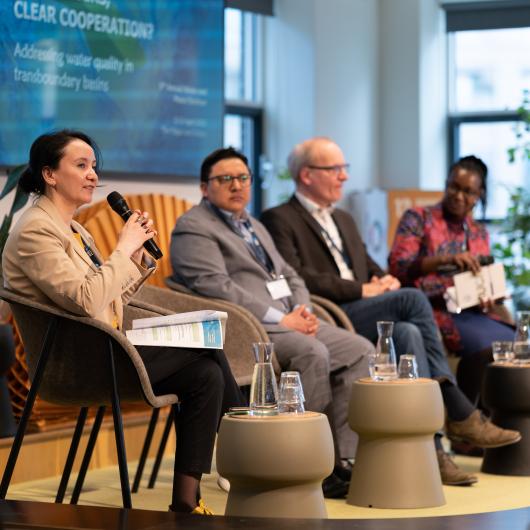Flowing together: the crucial role water quality can play in diplomacy

Diplomacy is often used to address water availability in resources shared by several countries. Water quality, however, often receives less attention in international diplomatic fora. Is this a missed opportunity?
In many regions, the quantity of water dominates international efforts while the quality of water remains largely unaddressed. At the 5th Annual Water and Peace Seminar, held on 12-13 April, 2023 in The Hague, researchers, policy makers, practitioners and civil society representatives explored whether discussions on water quality can advance transboundary cooperation and peace.
Water quality diplomacy in transboundary basins
Despite an expanding body of international law and basin agreements, the quality of the water in shared waterbodies is degrading. Over 80% of transboundary rivers are polluted by wastewater, nutrients and chemicals, including emerging contaminants like PFAS. Degrading water quality worsens the stress on water resources and impacts the health, livelihood and quality of life of anyone residing in transboundary basins. The situation poses a challenge to transboundary water governance, but also offers an opportunity for improved water cooperation.
Countries in various basins have addressed water-quality related challenges by establishing institutional and legal frameworks, launching joint efforts, and negotiating. Examples include the Danube, Lake Victoria and Orange-Senqu basins as well as boundary waters shared by United States and Mexico - all have demonstrated the importance of working together to tackle degradation. But globally, cooperation is often difficult: few transboundary river basins and aquifers have comprehensive agreements on water quality.
Discussions at the hybrid seminar explored why cooperation and conflict develop in relation to water quality, as well as how water diplomacy is implemented. In addition, speakers shared best practices to govern water quality in transboundary basins. To encourage a frank discussion, the meeting was held under Chatham House Rules, meaning that individual speakers are not identified.
Building a successful approach
Participants reflected on what is needed to address global and basin-specific water quality challenges and emphasized the importance of transboundary cooperation. Robust institutional arrangements, such as regulatory frameworks and river basin organizations, can support cooperation, they noted, as can defining, collecting and using data. To overcome challenges in establishing cooperation and balanced agreements, participants recommended taking measures to build trust and integrate economies and regions, and involving stakeholders.
While transboundary cooperation and institutions can help address water quality, they alone cannot bring change, unless accompanied by concerted civil society action, speakers said, noting that civil society actors can build support for and awareness about international cooperation and protective policies. Speakers also highlighted how civil society can implement water quality protection, which in turn can reduce strain on international relationships.
In many basins, water quality is less politicized than water quantity, speakers noted, arguing that this offered an opportunity for both state and non-state actors to collaborate and improve international responses.
However, the complexity of water quality can hinder constructive discussions and meaningful action, participants shared. Recommendations to overcome this obstacle included simplifying the discussions by, for example, starting the discussion with one single pollutant, or finding a cause to rally around – this could be an indicator species, like salmon in the Rhine basin or river dolphins in the Ganga. Discussions concluded with a strong call to action to raise awareness and efforts to address water quality in transboundary systems.
Clean rivers, clear cooperation?
In some basins, work on water quality has been an entry-point that helped strengthen collaboration over water resources or has helped existing institutions evolve. Through either route, the enhanced collaboration benefits regional stability and conflict mitigation.
By including actors at all levels and learning from other basins, governments can address environmental degradation in a cooperative manner that builds meaningful collaboration over shared water resources, speakers concluded.
Alyssa Offutt
PhD Candidate
